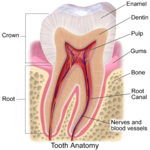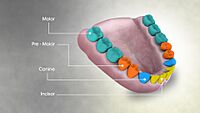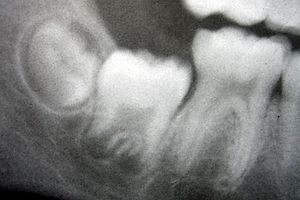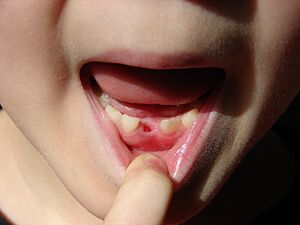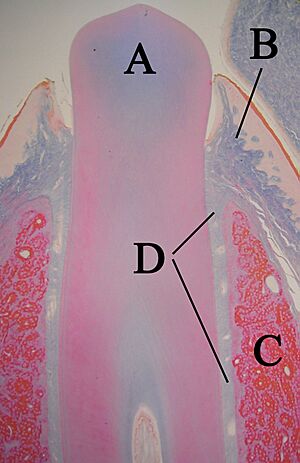Human tooth facts for kids
Quick facts for kids Human tooth |
|
|---|---|
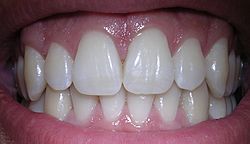 |
|
| Image showing incisors and canine teeth, situated in gums above and below | |
| Latin | dens |
Your teeth are amazing tools! They help you chew and break down food. This prepares food for swallowing and digestion. Because of this, teeth are a key part of your digestive system.
Humans have four main types of teeth. These are incisors, canines, premolars, and molars. Each type has a special job. Incisors cut food, canines tear it, and premolars and molars crush it. The bottom parts of your teeth, called roots, are held firmly in your jawbones. These roots are covered by your gums. Teeth are made of several different materials. These materials vary in how hard and dense they are.
Like most mammals, humans grow two sets of teeth. The first set is called deciduous teeth. You might know them as "baby teeth" or "milk teeth." There are usually 20 of these primary teeth. Baby teeth typically start to appear around six months of age. This process, called eruption, can sometimes be uncomfortable for infants. Rarely, some babies are born with one or more teeth already visible. These are known as neonatal teeth.
Contents
Understanding Your Teeth
Studying the structure of teeth is called dental anatomy. This field looks at how teeth grow, what they look like, and how they are grouped. It helps dentists identify and describe teeth during treatments.
The visible part of your tooth is called the anatomic crown. This part is covered in enamel. It sits above the gum line. Most of the crown is made of dentin, with a space inside called the pulp chamber. The roots are below the gum line. They are covered with cementum. Like the crown, roots are mostly made of dentin. They also contain pulp canals.
Most canines and premolars usually have one root. However, some upper premolars can have two. Lower molars often have two roots. Upper molars typically have three roots. Sometimes, teeth can have extra roots.
How Teeth Are Built
Humans usually have 20 primary teeth. They also have 32 permanent, or adult, teeth. Teeth are grouped into incisors, canines, premolars, and molars. Incisors are for cutting. Canines are for tearing. Molars and premolars are for grinding food.
Each tooth has unique features. Dentists use special systems to name and identify each tooth. The FDI World Dental Federation notation is used globally. The Universal Numbering System is common in the United States. The Palmer notation is still used by some in the United Kingdom.
Baby Teeth vs. Adult Teeth
You have 20 primary teeth in total. Ten are in your upper jaw and ten in your lower jaw. These include two types of incisors (central and lateral) and two types of molars (first and second). All primary teeth are eventually replaced by permanent teeth.
You have 32 permanent teeth. Sixteen are in your upper jaw and sixteen in your lower jaw. These include incisors, canines, premolars, and molars. The very back molars are often called "wisdom teeth." They usually appear between ages 17 and 25. Sometimes, wisdom teeth do not grow in properly or at all. They may need to be removed.
If you have more teeth than usual, they are called supernumerary teeth. If you have fewer teeth than usual, it is called hypodontia. There are small differences between male and female teeth. Male teeth and jaws tend to be a bit larger. Male teeth also have more dentin, while female teeth have more enamel.
The Main Parts of a Tooth
Each tooth is made of four main parts. These are enamel, dentin, cementum, and dental pulp. Each part has a special role in keeping your tooth healthy and strong.
Strong Enamel: Your Tooth's Shield
Tooth enamel is the hardest material in your body. It is mostly made of minerals, like a strong crystal. Enamel covers the crown of your tooth. It protects the softer layers underneath. Enamel is usually light yellow to grayish-white. It can look slightly blue where there is no dentin beneath it.
Enamel is very strong but can also be brittle. The dentin underneath helps support it. Enamel does not contain collagen, unlike dentin and bone. Special proteins help enamel form properly when teeth are developing. Sometimes, enamel does not form correctly. This leaves the dentin exposed.
Dentin: The Tooth's Body
Dentin is found under the enamel and cementum. It forms the main body of the tooth. Dentin is made by special cells called odontoblasts. It is a yellowish, porous material. Dentin is softer than enamel. This means it can decay faster if not cared for. However, it still protects the tooth's inner parts.
Dentin has tiny channels called dentinal tubules. These channels run from the pulp to the outer edges of the dentin. There are three types of dentin. Primary dentin forms first. Secondary dentin forms slowly throughout your life. Tertiary dentin forms quickly in response to damage, like cavities.
Cementum: Root's Protector
Cementum is a bone-like substance. It covers the root of your tooth. It is made of minerals, organic material, and water. Cementum is formed by cells called cementoblasts. It is thickest at the very tip of the root. Cementum is yellowish and softer than dentin and enamel.
Its main job is to help the periodontal ligaments attach to the tooth. This keeps the tooth stable in your jaw. The cementum near the top of the root has no cells. The cementum near the root tip has cells.
Dental Pulp: The Tooth's Heart
The dental pulp is the soft center of your tooth. It contains blood vessels and nerves. These enter the tooth through a small hole at the root's tip. Odontoblasts, which make dentin, are found at the edge of the pulp. The pulp is often called "the nerve" of the tooth. It helps you feel hot, cold, and pressure.
How Teeth Grow and Erupt
Tooth development is a complex process. It involves cells forming, growing, and finally erupting into your mouth. This process is similar in humans and many other animals. For healthy teeth, enamel, dentin, cementum, and the periodontium must all develop correctly.
Primary teeth start forming early in embryo development. This happens between the sixth and eighth weeks. Permanent teeth begin to form around the twentieth week. If teeth do not start forming around these times, they may not develop at all.
Scientists have studied how tooth development begins. It is believed that certain tissues in the jaw are essential for teeth to start growing.
Tooth development happens in stages. These stages are called the bud, cap, bell, and maturation stages. It can sometimes be tricky to tell exactly which stage a tooth is in. This is because development is a continuous process.
A tooth bud is a group of cells that will become a tooth. It has three main parts. These are the enamel organ, the dental papilla, and the dental follicle. The enamel organ makes the enamel. The dental papilla forms the dentin. It also helps decide the shape of the tooth crown. The dental follicle creates cells that form cementum, jaw bone, and the periodontal ligaments. These ligaments connect teeth to the bone.
When Teeth Appear
Tooth eruption is when teeth move into the mouth and become visible. Research suggests that periodontal ligaments are very important for this process. Primary teeth erupt from about six months to two years of age. These are the only teeth in the mouth until about age six. Then, the first permanent tooth appears.
The time when you have both primary and permanent teeth is called the mixed stage. This stage lasts until all primary teeth are lost. Then, all remaining permanent teeth erupt.
Many ideas have tried to explain why teeth erupt. One idea was that the growing root pushed the tooth out. Another, called the cushioned hammock theory, suggested a ligament around the root. This was later found to be a mistake from preparing slides. Today, most scientists believe that the periodontal ligaments are the main force behind eruption.
Losing primary teeth has been linked to a child's readiness for school.
Keeping Your Teeth Strong
The periodontium is the support system for your tooth. It helps attach the tooth to the surrounding tissues. It also allows you to feel touch and pressure on your teeth. The periodontium includes the cementum, periodontal ligaments, alveolar bone, and gingiva (gums). Cementum is the only part that is actually part of the tooth.
The Tooth's Support System
Periodontal Ligaments: Tooth Anchors
The periodontal ligament is a special tissue. It connects the cementum of your tooth to the alveolar bone. This tissue surrounds the root of the tooth within the bone. These ligaments are very thin. They help hold the tooth in place. They also help with bone formation and sensation.
Alveolar Bone: The Jaw's Grip
The alveolar bone is the part of your jawbone that holds your teeth. It forms the "socket" around each tooth. Like all bones, alveolar bone changes throughout your life. Special cells build bone, and other cells remove it. This happens especially when force is put on a tooth, like during orthodontics.
Gingiva: Your Gums
The gingiva, or "gums," is the soft tissue that covers your jawbones. There are different types of gum tissue. Some gum tissue is visible in your mouth. Other types attach directly to the tooth. This attachment helps protect the tooth and its roots.
Protecting Against Tooth Decay
What is Plaque?
Dental plaque is a sticky film that forms on your teeth. It is full of many different bacteria. If you do not remove plaque regularly, it can lead to gum problems. These problems include gingivitis. Over time, plaque can harden into "tartar" along your gums.
Some bacteria in your mouth feed on food bits, especially sugars. Without oxygen, they make lactic acid. This acid dissolves minerals like calcium from your enamel. This process is called "demineralization." It can lead to tooth damage. Your saliva helps neutralize these acids. This allows minerals to return to your enamel, a process called remineralization. If you clean your teeth well, they can repair themselves. However, saliva cannot get through plaque to neutralize the acid.
Cavities: When Teeth Get Holes
Dental caries, or "cavities," is an infection that damages teeth. This disease can cause pain, tooth loss, and further infection. Cavities have been around for a long time. Evidence shows they existed in ancient times. The biggest increases in cavities have been linked to changes in diet.
Today, cavities are still very common worldwide. In the United States, dental caries is the most common chronic childhood disease. It is much more common than asthma. Even in countries where cavities have decreased, some children still get them more often.
Cavities are caused by certain acid-producing bacteria. These bacteria cause the most damage when they feed on carbohydrates like sugar. The acids they produce harm teeth because tooth enamel is sensitive to low acid levels. Dentists can use various treatments to restore damaged teeth. However, there is no way to grow back large amounts of tooth structure. That is why dentists recommend oral hygiene and healthy eating to prevent cavities.
Daily Tooth Care Habits
Brushing and Flossing Basics
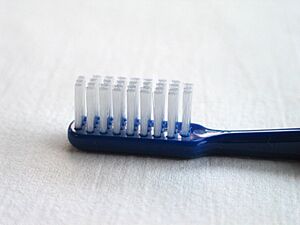
Oral hygiene means keeping your mouth clean. It helps prevent cavities, gum disease, bad breath, and other tooth problems. This includes both professional cleanings and your daily care. Regular cleanings by a dentist or hygienist remove tartar. Tartar can form even with good brushing and flossing.
The goal of cleaning your teeth is to remove plaque. Plaque is mostly bacteria. Experts recommend brushing twice a day. This should be in the morning and evening, or after meals. A toothbrush removes most plaque. However, it cannot reach between teeth. So, flossing is also very important. When used correctly, dental floss removes plaque from between teeth and along the gum line. This is where gum disease and cavities often start.
Electric toothbrushes can also help with oral hygiene. A person who brushes well manually can achieve similar results. However, electric toothbrushes can be very helpful for those who struggle with manual brushing. They are especially good for people with conditions like rheumatoid arthritis that affect hand movement.
Extra Protection for Your Smile
Fluoride therapy is often suggested to protect against cavities. Adding fluoride to water and using fluoride supplements can reduce cavities. Fluoride helps by making enamel stronger. It makes enamel more resistant to acid attacks. Topical fluoride, like fluoride toothpaste or mouthwash, also protects tooth surfaces. Many dentists apply fluoride solutions during routine cleanings.
Dental sealants are another way to prevent cavities. They create a barrier against bacteria on tooth surfaces. Sealants can last up to ten years. They are mostly used on the chewing surfaces of molars. This is common for children and young adults. It helps those who might find brushing and flossing difficult. Dentists or hygienists apply sealants in a quick procedure.
Fixing Damaged Teeth
When a tooth is damaged, dentists can repair it. They use different treatments to restore its shape and function. These repairs can be made from various materials. Common materials include glass ionomer, amalgam, gold, porcelain, and composite.
Small repairs inside a tooth are called "intracoronal restorations." These can be made directly in your mouth. Larger repairs, like artificial crowns or veneers, cover more of the tooth.
If a tooth is lost, there are ways to replace it. These include dentures, bridges, or implants. Dentures are usually the least expensive option. Implants are often the most expensive. Dentures can replace many teeth or a whole arch. Bridges fill smaller gaps using nearby teeth for support. Dental implants can replace one or many teeth. Implants are often preferred for their natural look and feel. They can also help support dentures.
Common Tooth Issues
Tooth problems can be caused by how teeth develop or by things in the environment. Some developmental problems have no clear cause. Environmental factors can affect teeth as they grow. They can also damage teeth after they are fully formed. These factors can also change tooth color or how teeth erupt. Developmental problems often affect the number, size, shape, and structure of teeth.
Changes During Tooth Growth
Too Much or Too Little Enamel
Enamel hypoplasia is when not enough enamel forms. This can cause pits or grooves on the tooth. Sometimes, large areas of enamel might be missing. Other issues can change enamel's appearance without affecting its amount. This can make enamel look different or have white, yellow, or brown spots. These problems can be caused by nutrition, certain illnesses, low calcium, dental fluorosis, or injury. Dental fluorosis happens from too much fluoride intake. It can make teeth spotted, yellow, or even black.
Sometimes, enamel problems are linked to conditions like celiac disease. Turner's hypoplasia is missing enamel on a permanent tooth. This often happens due to an infection in a nearby baby tooth.
Teeth That Don't Form Right
- Anodontia means a total lack of tooth development.
- Hyperdontia is having more teeth than normal.
- Hypodontia is missing one or more teeth.
- Oligodontia means missing six or more teeth.
Some health conditions can cause extra or missing teeth.
Abnormality in Size
- Microdontia is when teeth are smaller than usual.
- Macrodontia is when teeth are larger than usual.
A single small tooth is most common in the upper side incisors. Wisdom teeth can also be small. All teeth being large can happen with pituitary gigantism.
Abnormality in Shape
- Gemination is when a developing tooth tries to split into two.
- Fusion is when two nearby teeth join together as they grow.
- Concrescence is when two teeth join only at their cementum.
- Extra cusps are additional bumps on a tooth. Examples include a Talon cusp or Cusp of Carabelli.
- Dens invaginatus means a deep fold in a tooth, making it look like a "tooth within a tooth."
- Ectopic enamel is enamel found in an unusual spot, like on the root.
- Taurodontism is when the tooth body and pulp chamber are enlarged.
- Hypercementosis is too much cementum forming. This can be from injury or certain health issues.
- A dilaceration is a bend in the root, possibly from an injury during tooth formation.
- Supernumerary roots means a tooth has more roots than expected.
Cleft Lip and Palate: Dental Effects
Children with cleft lip and palate (CLP) often have various dental issues. Both baby and adult teeth can be affected. These problems are usually seen on the side of the cleft. Missing teeth, extra teeth, or discolored teeth are common. Enamel problems and delayed root growth also occur. The upper side incisor near the cleft is most often affected. These issues can lead to crowded teeth. It is important for dentists to plan treatment carefully. This ensures good function and appearance.
Many studies have looked at how common these dental problems are in CLP patients. For example, one study found that male patients with CLP had more missing or extra teeth. Another study found that missing teeth were common, especially the upper side incisor. Other findings included small teeth, bent roots, and enamel problems. These issues were more common in patients with clefts on both sides.
It is clear that patients with cleft lip and palate may have many dental problems. A thorough check-up, including X-rays, is vital. This helps dentists treat and prevent further issues. Patients with cleft lip and palate are often eligible for orthodontics. Working with an orthodontist is key for successful treatment.
Abnormality in Structure
- Amelogenesis imperfecta is when enamel does not form correctly or at all.
- Dentinogenesis imperfecta is when dentin does not form properly. It is sometimes linked to osteogenesis imperfecta.
- Dentin dysplasia is a disorder affecting the roots and pulp of teeth.
- Regional odontodysplasia affects enamel, dentin, and pulp. It makes teeth look "ghostly" on X-rays.
- Diastema is a gap between two teeth. This happens when there is an imbalance between jaw size and tooth size.
See also
 In Spanish: Diente humano para niños
In Spanish: Diente humano para niños
- Barodontalgia
- Dentistry
- Dental auxiliary
- Dental assistant
- Dental hygienist
- Dental technician
- Dental braces
- Dental notation
- Dental tourism
- Growing teeth
- Head and neck anatomy
- Regenerative endodontics
- Socket preservation
- Tongue
- Tooth fairy
- Tooth painting
- Tooth regeneration
 | Madam C. J. Walker |
 | Janet Emerson Bashen |
 | Annie Turnbo Malone |
 | Maggie L. Walker |


